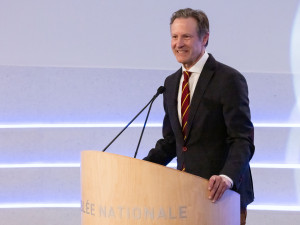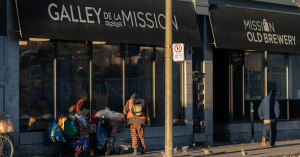
Federal funding for non-profits needs revamp in Canada

The process must be less restrictive so organizations can more effectively deliver their programs and services.
Non-profits are at the heart of our communities. Each day in Montreal and across Canada these organizations serve the diverse needs of hundreds of thousands of people of all ages and backgrounds.
Non-profits serve our collective good in countless ways: from offering high-quality and affordable childcare to mental health supports and protecting the environment.Canadians clearly need and want strong non-profits, as does the federal government, which relies on the sector to deliver many of its services.
However, despite the essential societal role played by charities and non-profits, the government funds the sector in a way that is inefficient and does not effectively support communities.
This is a crucial concern because the non-profit sector’s capacity to serve is in serious jeopardy. The pandemic and cost-of-living crisis have combined to drive demand for services through the roof amid declines in donations and increasing costs.
A survey commissioned by CanadaHelps finds 22 per cent of Canadians plan to access non-profit services to meet basic needs in the next six months, up from 14 per cent at the beginning of 2022.
Yet non-profits are locked in a constant struggle to meet demand because the government typically funds organizations on a single project basis and does not like to support initiatives more than once.This way of funding traps many charities in a cycle of constantly reinventing their programs to secure new grants.
Non-profits, like businesses and government, have basic core operating costs. But, when the government funds a charitable project, it often fails to cover the full cost of service delivery and does not pay for essential operating expenses such as computers, rent or insurance.Organizations are too often left scrambling to cover these mission critical overheads. For communities, this increases the likelihood services people rely on will be unavailable to all who need them or will be cancelled outright.
These issues impact the Old Brewery Mission every day.The organization has to get creative in order to provide appropriate and effective tools for its employees. This is particularly challenging for the housing support team, who, for example, do not all have laptops to take progress notes or consult files when they visit clients in their new homes.
Additionally, the lack of funding for operating expenses can also make it harder to innovate. Because of restrictions that come with project-based funding, the Old Brewery Mission is unable to invest as much as it would like in the development of innovative homelessness prevention programs despite this being one of its main priorities.Instead, the Old Brewery Mission looks to private donors to try to make this vision a reality.
Project-based funding also restricts the ability of non-profits to consult with communities to design new programs to meet emerging needs. Instead, because they rely on intermittent project funding to survive, non-profits must tailor their services to meet conditions set by government.
Our sector is calling on the federal government to use its 2023 budget to begin to fund non-profits and charities in a way that reflects our role as a trusted partner in delivering crucial programs and services to communities.This means providing funding in less restrictive ways, allowing organizations to use the funding to cover essential core operating costs so they can more effectively deliver their programs and services.
Finally, government funding programs must recognize that some parts of the sector have been underfunded due to systemic discrimination. We are asking that the government also take an equity approach to funding to help address, among other issues, historic underfunding of Black, Indigenous and 2SLGBTQ organizations.
To truly have the backs of people in need, the government must act now – in partnership with our sector – to change the way non-profits are funded.
Dernières nouvelles
-
 James Hughes, President and CEO of the Old Brewery Mission, receives the National Assembly Medal of Honour
James Hughes, President and CEO of the Old Brewery Mission, receives the National Assembly Medal of Honour -
 Meet Mariane Dupuis, psychosocial counsellor for the PRISM program
Meet Mariane Dupuis, psychosocial counsellor for the PRISM program -
 Will a 5.9% rent hike lead to more economic homelessness?
Will a 5.9% rent hike lead to more economic homelessness? -
 Homelessness in Montreal: Dismantling encampments isn’t the solution
Homelessness in Montreal: Dismantling encampments isn’t the solution -
 Meet Desmond Olsthoorn, Director of Emergency and Proximity Services
Meet Desmond Olsthoorn, Director of Emergency and Proximity Services - See all news